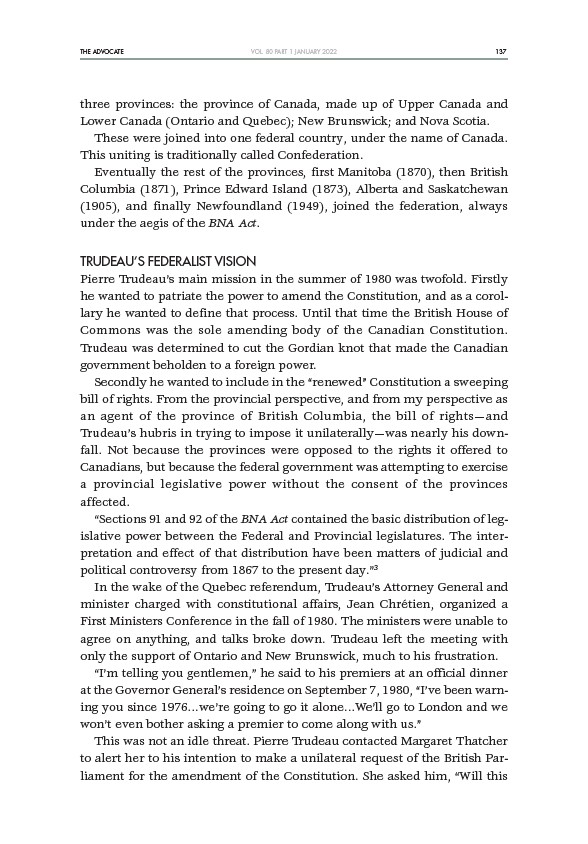
THE ADVOCATE 137
VOL. 80 PART 1 JANUARY 2022
three provinces: the province of Canada, made up of Upper Canada and
Lower Canada (Ontario and Quebec); New Brunswick; and Nova Scotia.
These were joined into one federal country, under the name of Canada.
This uniting is traditionally called Confederation.
Eventually the rest of the provinces, first Manitoba (1870), then British
Columbia (1871), Prince Edward Island (1873), Alberta and Saskatchewan
(1905), and finally Newfoundland (1949), joined the federation, always
under the aegis of the BNA Act.
TRUDEAU’S FEDERALIST VISION
Pierre Trudeau’s main mission in the summer of 1980 was twofold. Firstly
he wanted to patriate the power to amend the Constitution, and as a corollary
he wanted to define that process. Until that time the British House of
Commons was the sole amending body of the Canadian Constitution.
Trudeau was determined to cut the Gordian knot that made the Canadian
government beholden to a foreign power.
Secondly he wanted to include in the “renewed” Constitution a sweeping
bill of rights. From the provincial perspective, and from my perspective as
an agent of the province of British Columbia, the bill of rights—and
Trudeau’s hubris in trying to impose it unilaterally—was nearly his downfall.
Not because the provinces were opposed to the rights it offered to
Canadians, but because the federal government was attempting to exercise
a provincial legislative power without the consent of the provinces
affected.
“Sections 91 and 92 of the BNA Act contained the basic distribution of legislative
power between the Federal and Provincial legislatures. The interpretation
and effect of that distribution have been matters of judicial and
political controversy from 1867 to the present day.”3
In the wake of the Quebec referendum, Trudeau’s Attorney General and
minister charged with constitutional affairs, Jean Chrétien, organized a
First Ministers Conference in the fall of 1980. The ministers were unable to
agree on anything, and talks broke down. Trudeau left the meeting with
only the support of Ontario and New Brunswick, much to his frustration.
“I’m telling you gentlemen,” he said to his premiers at an official dinner
at the Governor General’s residence on September 7, 1980, “I’ve been warning
you since 1976…we’re going to go it alone…We’ll go to London and we
won’t even bother asking a premier to come along with us.”
This was not an idle threat. Pierre Trudeau contacted Margaret Thatcher
to alert her to his intention to make a unilateral request of the British Parliament
for the amendment of the Constitution. She asked him, “Will this